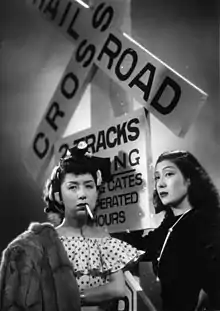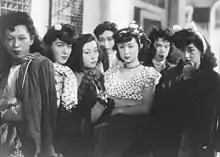| Women of the Night | |
|---|---|
 | |
| Directed by | Kenji Mizoguchi |
| Written by |
|
| Produced by | Hisao Itoya |
| Starring | |
| Cinematography | Kōhei Sugiyama |
| Edited by | Kanji Sugawara |
| Music by | Hisato Ōsawa |
Production company | |
| Distributed by | Shochiku |
Release date | |
Running time | 74 minutes |
| Country | Japan |
| Language | Japanese |
Women of the Night (夜の女たち, Yoru no onna-tachi) is a 1948 Japanese drama film directed by Kenji Mizoguchi starring Kinuyo Tanaka.[1][2]
Plot
In early post-war Osaka, three women, war widow Fusako, her sister Natsuko, an expatriate from Korea, and Kumiko, Fusako's sister-in-law, descend into prostitution, all for their individual reasons. Fusako, who lost her husband in the war and later her child due to illness, starts working for the company of the intrusive Kuriyama and becomes his mistress. When she learns that Natsuko, who has frequently changing partners, has an affair with Kuriyama, she vows to take her revenge out on men. Natsuko becomes pregnant by Kuriyama, who insists that she has an abortion, but the child is stillborn because Natsuko contracted syphilis. Kumiko, who was raped and robbed of her money after running away from home, has become a streetwalker. When Fusako witnesses Kumiko being beaten by other prostitutes because she entered their territory, she helps her sister-in-law and is beaten up herself. The two women leave the site, heading for an uncertain future.
Cast
- Kinuyo Tanaka as Fusako Owada
- Sanae Takasugi as Natsuko Kimishima
- Kumeko Urabe as madam of the brothel
- Tomie Tsunoda as Kumiko Owada
- Minpei Miyamoto as Kōji Owada
- Mitsuo Nagata as Kenzō Kuriyama
- Kenzō Tanaka as Shuichi Hirata
- Fusako Maki as female reporter
- Kimie Hayashi as woman of darkness
- Umeko Ōbayashi as Tokuko Owada
- Kikue Mori as store owner
Production

Censor Harry Slott of the Civil Information and Education Section (CIE) Motion Picture Office endorsed the film's subject of women who resort to prostitution, and several health and welfare organisations announced their support for the production.[3] Women of the Night was filmed on location in Osaka,[4][5] including a scene in a hospital ward for prostitutes.[6]
Reception
Contemporary reactions to Mizoguchi's film were mixed, ranging from condemnation for being sensational to praise for its realistic depiction of women struggling to survive in post-war Japan.[3] In his 2005 biography on Mizoguchi, Mark Le Fanu titled Women of the Night, although a minor film in his opinion, one of the director's "most outspokenly engaged denunciations of the oppression of women in society".[7] Reviewers, including Le Fanu, Donald Richie,[8] and Dudley and Paul Andrew[9] also drew comparisons between Mizoguchi's film and Italian neorealism.
Awards
Mizoguchi's film reached number three on Kinema Junpo's list of the ten best Japanese films of 1948,[10] and Kinuyo Tanaka received the same year's Mainichi Film Award for Best Actress (for Women of the Night and A Hen in the Wind).[11]
Legacy
Women of the Night was screened at the Harvard Film Archive in 2014 as part of its retrospective on Mizoguchi,[12] and by the British Film Institute in 2017 as part of its Tears and Laughter: Women in Japanese Melodrama special.[13]
References
- 1 2 "夜の女たち". Japanese Movie Database. Retrieved 29 August 2023.
- 1 2 "夜の女たち". Kinenote. Retrieved 29 August 2023.
- 1 2 Hirano, Kyoko (1992). Mr. Smith Goes to Tokyo: Japanese Cinema Under the American Occupation, 1945–1952. Washington and London: Smithsonian Institution Press. ISBN 1-56098-157-1.
- ↑ "Women of the Night". The Criterion Collection. Retrieved 29 August 2023.
- ↑ Brody, Richard (2 December 2009). "Women of the Night". The New Yorker. Retrieved 29 August 2023.
- ↑ Shindо̄, Kaneto (director) (2001). Kenji Mizoguchi: The Life of a Film Director (DVD). Japan: Asmik Ace.
- ↑ Le Fanu, Mark (2005). Mizoguchi and Japan. London: BFI Publishing. ISBN 978-1-84457-057-7.
- ↑ Richie, Donald (2005). A Hundred Years of Japanese Film (Revised ed.). Tokyo, New York, London: Kodansha International. p. 116. ISBN 978-4-7700-2995-9.
- ↑ Andrew, Dudley; Andrew, Paul (1981). Kenji Mizoguchi, a Guide to References and Resources. G.K. Hall. p. 211. ISBN 9780816184699.
- ↑ "キネマ旬報 ベスト・テン 1948年・第22回". Kinenote (in Japanese). Retrieved 29 August 2023.
- ↑ "毎日映画コンクール 第3回(1948年)". Mainichi (in Japanese). Retrieved 29 August 2023.
- ↑ "Women of the Night (Yoru no Onnatachi)". Harvard Film Archive. Retrieved 29 August 2023.
- ↑ "Tears and Laughter: Women in Japanese Melodrama". Electric Shadows. 11 October 2017. Retrieved 29 August 2023.